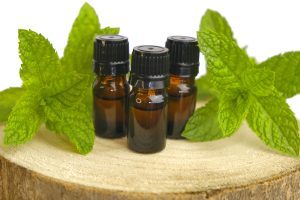10 Unbelievable Health Benefits of Peppermint

Peppermint has many incredible health benefits that can help you live a healthier, happier life, not to mention its soothing aroma that helps to promote a feeling of overall health and well-being. Peppermint, which belongs to the mint family of plants, has been used as an herbal remedy since the beginning of the 16th century, and has recently become more common in aromatherapy thanks to its proven ability to improve physical and mental health by encouraging relaxation, boosting energy levels, and relieving stress. Here are 10 ways peppermint can improve health!
Natural Stress Relief
Peppermint is a natural stress reliever. It works for both physical and mental stresses. A study published in Phytomedicine found that peppermint oil has a stress-relieving effect on patients undergoing chemotherapy. For anxiety, peppermint oil can help you relax and makes you feel calmer by reducing your heart rate and blood pressure. In a study published in Neuroscience Letters, researchers gave participants either mint or chamomile tea. The peppermint-sipping participants had reduced stress levels by as much as 25%. In addition to relieving stress, mint has also been found to relieve headaches and nausea. It is believed that some of peppermint’s benefits are due to its menthol component; another one of its active ingredients, menthone, acts as an anti-inflammatory agent. If you are suffering from any of these issues or just want to reduce stress levels naturally then make sure to add peppermint to your daily regiment.
Promotes a Healthy Heart
 The fact that peppermint can help promote a healthy heart should come as no surprise, since it’s also thought to reduce hypertension and stress levels. A team of researchers from Youngstown State University found that an herbal extract made from peppermint was able to successfully reduce blood pressure in subjects who had both normal and high blood pressure. Peppermint oil also contains menthol, which is scientifically proven to improve heart health and reduce instances of atherosclerosis and coronary artery disease. If you want to incorporate this healthy herb into your daily routine, start by drinking some peppermint tea, or just breathing in the aroma of peppermint oil next time you have a cold or feel run down.
The fact that peppermint can help promote a healthy heart should come as no surprise, since it’s also thought to reduce hypertension and stress levels. A team of researchers from Youngstown State University found that an herbal extract made from peppermint was able to successfully reduce blood pressure in subjects who had both normal and high blood pressure. Peppermint oil also contains menthol, which is scientifically proven to improve heart health and reduce instances of atherosclerosis and coronary artery disease. If you want to incorporate this healthy herb into your daily routine, start by drinking some peppermint tea, or just breathing in the aroma of peppermint oil next time you have a cold or feel run down.
Improves Digestion
One thing that sets peppermint apart from other mints is that it’s naturally a little stronger. While it shares many of the same benefits as other mint varieties, peppermint also acts as an expectorant and increases bile production. These features make peppermint great for easing digestion and soothing stomach problems. A strong digestive system can be good for all-around health, so drinking peppermint tea regularly is a great way to improve your digestion.
Boosts the Immune System
The ability to boost your immune system isn’t just a cure for colds—it also helps you fight illness and other health problems, too. The essential oils in peppermint can help clear your sinuses (so expect your nose to run) while fighting off infection that leads to respiratory problems. So if you have asthma or chronic obstructive pulmonary disease (COPD), then consider adding peppermint to your diet. You can even drink peppermint tea as a natural remedy for breathing issues like allergies, bronchitis, and even pneumonia. Just remember that since peppermint is an herb, it will take some time for your body to adapt.
Fights Nausea
Peppermint’s long been used to reduce nausea and indigestion. In fact, research shows that it is nearly as effective at fighting nausea as prescription medications like Zofran. The study went on to suggest that peppermint oil could be a safe alternative to other methods of treating stomach issues, such as taking medication or using over-the-counter products like antacids. Since many people are hesitant to use medication, peppermint may help ease some symptoms without causing serious side effects like drowsiness or dizziness.
Relieves Menstrual Cramps
Peppermint has a cooling effect on your body, and it’s anti-inflammatory and antispasmodic. Research shows that peppermint may be beneficial in reducing menstrual cramps and back pain. For example, one study compared women who took 6 drops of peppermint oil mixed with sweet almond oil for a week before their period began to women who received no treatment. The treatment group reported a 52% decrease in menstrual cramps!
Eases Pain
When you consume peppermint, it is absorbed into your digestive system and bloodstream. The active ingredients in peppermint have an anti-inflammatory effect in your body that eases pain. A study published in Phytotherapy Research has shown that peppermint oil can increase sensitivity to pain relief. This means that products with essential oils such as peppermint can make products like acetaminophen or ibuprofen stronger and more effective at reducing pain. The great thing about using peppermint for pain is it doesn’t come with a risk of any side effects or damage to your liver or kidneys, which are things you must consider when taking pharmaceutical drugs for pain relief.
Freshens Breath
One reason why peppermint is good for your health is because it freshens breath. This is great news for those who have a hard time getting rid of bad breath. The smell of peppermint naturally discourages people from wanting to get too close, which means bad breath doesn’t stand a chance when you have peppermint around. Additionally, peppermint has antibacterial properties that can kill bad breath-causing bacteria in your mouth so you won’t even have to worry about it!
Heals Cuts and Scrapes
If you’ve got cuts and scrapes, try reaching for peppermint instead of Neosporin. If it’s not too deep, peppermint oil may help by numbing minor aches and pains and soothing skin irritations. Mix a drop or two with a carrier oil like coconut or jojoba to apply directly to wounds for relief. Keep in mind that it can take time for you to heal—and if there are deeper wounds, seek professional medical attention!
Reduces Inflammation
The menthol in peppermint helps reduce inflammation in a way similar to an anti-inflammatory medication. In addition, peppermint oil is known to help relieve pain caused by arthritis and lower back strain. One study found that peppermint oil had a beneficial effect on patients with osteoarthritis when combined with another treatment called physiotherapy. Peppermint may also have an anti-spasmodic effect, which can be especially helpful for people who suffer from irritable bowel syndrome (IBS).
Cautions
There are some risks associated with peppermint, however; do not use if you have GERD. Peppermint is not recommended for people with gastroesophageal reflux disease or those with hiatal hernia as it may aggravate these conditions.

You must be logged in to post a comment.